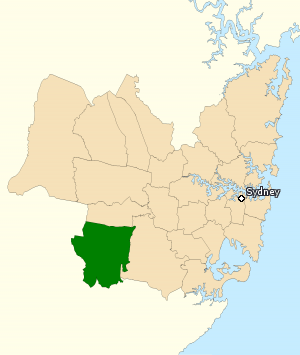Division of Werriwa facts for kids
Quick facts for kids WerriwaAustralian House of Representatives Division |
|
|---|---|

Division of Werriwa (green) in New South Wales
|
|
| Created | 1901 |
| MP | Laurie Ferguson |
| Party | Labor |
| Namesake | Lake George (Aboriginal name) |
| Area | 159 km2 (61.4 sq mi) |
| Demographic | Outer Metropolitan |
The Division of Werriwa is a special area in New South Wales. People living here get to choose someone to represent them in the Australian House of Representatives, which is part of Australia's Parliament. Think of it like a team in a big game, and Werriwa is one of the teams that sends a player to the main event.
The name Werriwa comes from the local Aboriginal language. It is the name for Lake George. When this area was first created in 1900, Lake George was actually inside its borders. Werriwa was one of the very first 75 areas created for Australia's first national election in 1901. Back then, it was a very large rural area. It stretched from the south-west of Sydney all the way to the northern part of what is now the ACT.
Over many years, more and more people moved to Sydney. Because of this, the boundaries of Werriwa had to be changed. The area became much smaller. By 1913, Lake George was no longer part of Werriwa. Now, Werriwa is a suburban area in south-western Sydney, over 150 kilometres away from Lake George! It still keeps the name Werriwa because it was one of the original areas from when Australia first became a nation. The people who draw the boundaries, the Australian Electoral Commission, try to keep these original names.
Today, Werriwa includes suburbs like Austral, Bardia, Bow Bowing, Casula, Claymore, Denham Court, Edmondson Park, Eschol Park, Glenfield, Horningsea Park, Hoxton Park, Ingleburn, Leppington, Lurnea, Macquarie Fields, Minto, Minto Heights, Prestons, Raby, St Andrews and Varroville. It also covers parts of Liverpool, Leumeah and West Hoxton.
Who Represents Werriwa?
The people who represent Werriwa in Parliament are called Members. Here is a list of the Members who have represented Werriwa over the years:
| Member | Party | Term | |
|---|---|---|---|
| Alfred Conroy | Free Trade | 1901–1906 | |
| David Hall | Labor | 1906–1912 | |
| Benjamin Bennett | Labor | 1912–1913 | |
| Alfred Conroy | Commonwealth Liberal | 1913–1914 | |
| John Lynch | Labor | 1914–1916 | |
| National Labor | 1916–1917 | ||
| Nationalist | 1917–1918 | ||
| Hubert Lazzarini | Labor | 1919-1931 | |
| Lang Labor | 1931–1931 | ||
| Walter McNicoll | Country | 1931–1934 | |
| Hubert Lazzarini | Lang Labor | 1934–1936 | |
| Labor | 1936–1952 | ||
| Gough Whitlam | Labor | 1952–1978 | |
| John Kerin | Labor | 1978–1994 | |
| Mark Latham | Labor | 1994–2005 | |
| Chris Hayes | Labor | 2005–2010 | |
| Laurie Ferguson | Labor | 2010–present | |
Werriwa is known as a very "safe seat" for the Australian Labor Party (ALP). This means that the Labor Party has won the elections in Werriwa for a very long time, without a break since 1934.
A famous person who represented Werriwa was Gough Whitlam. He was the Member for Werriwa from 1952 to 1978. He later became the Prime Minister, which is the leader of the country!
Another important Member for Werriwa was Mark Latham. He held the seat from 1994 to 2005. Mark Latham was also the leader of the Labor Party and the Leader of the Opposition from 2003 to 2005. The Leader of the Opposition is the leader of the main party that is not in power.
In March 2005, there was a special election called a by-election. This happens when a Member leaves Parliament before the next general election. In this by-election, Chris Hayes from the Labor Party was elected. He won with more than half of all the votes. There were many other people who wanted to be the Member, but none of them got as many votes as Chris Hayes.
Images for kids
-
Lake George, the Aboriginal name of which is the division's namesake


